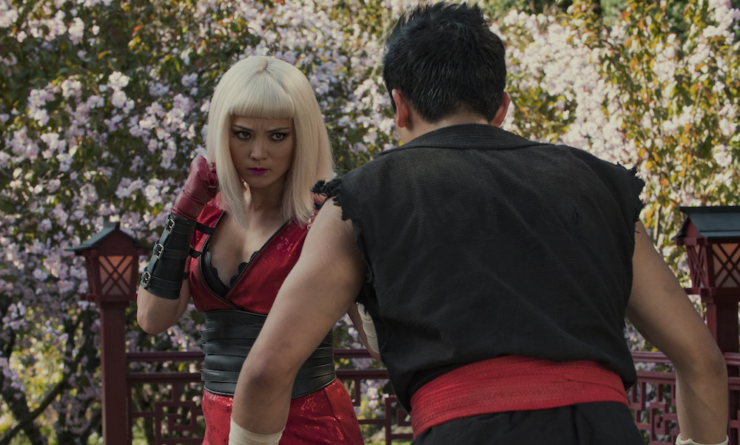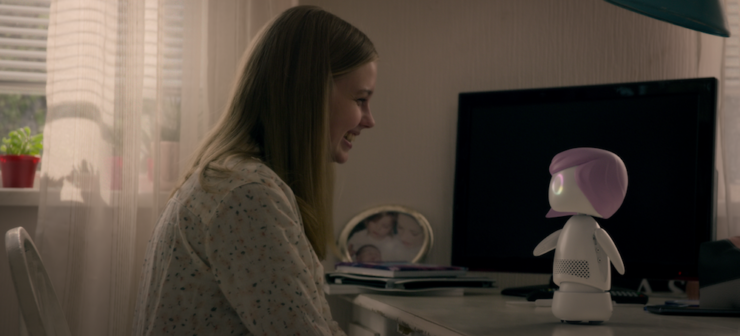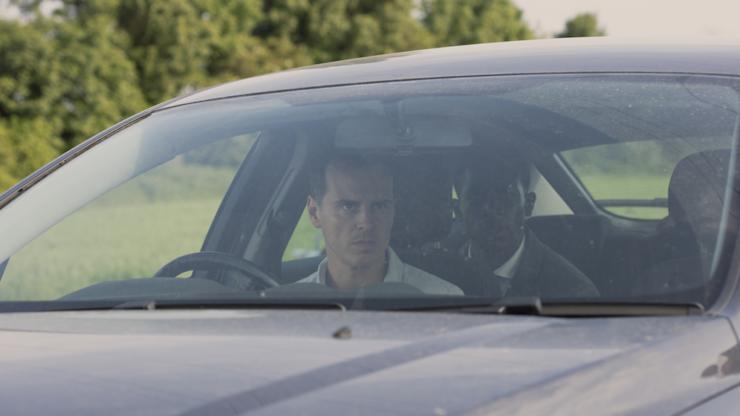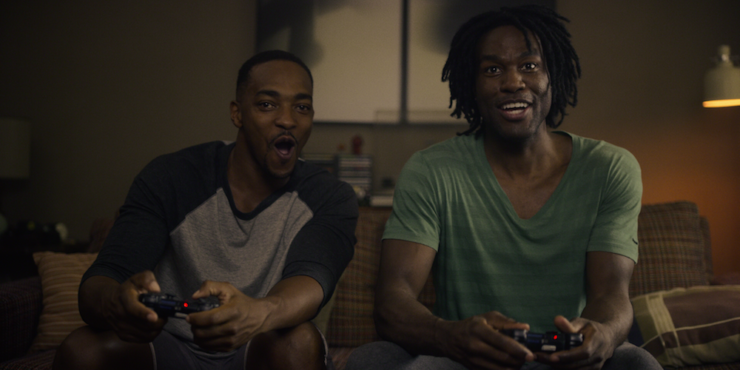In the world of Black Mirror, the greatest tragedy occurs because of a moment of boredom. A man recounts driving down an unending stretch of road late at night—”and it’s boring,” he groans of that long, unbroken road, devoid of any stimulation or variety. It would be harsh, not to mention inaccurate, to call the latest season of Black Mirror boring, because a peek inside Charlie Brooker’s brain will always be amusing. However, five years into his dire predictions about humanity and technology, it’s getting harder and harder to be surprised.
In part it’s because we’ve seen the same narrative beats, presented more compellingly, in past installments: virtual reality as a space of freedom for queer identity; tragedy refracted and disseminated through social media; digital copies that assert their uniqueness even over their flesh-and-blood predecessors. But also this season’s three offerings, even the ones that skew more outlandish, also just feel much more contemporary than near-future. Yet despite some duds in execution, Black Mirror still provokes.
Spoilers for Black Mirror season 5.
Part of what made watching this season so odd was that there wasn’t the immediate urge to rush to the Black Mirror subreddit and document every Easter egg or speculate over bigger implications for what Brooker has confirmed is a shared universe. This time around, there weren’t really any mysteries to unravel; each episode was fairly straightforward, the plot beats sometimes even erring on the side of predictable.
The common thread tying together two of the episodes is, no surprise, TCKR Systems and their “cookies”—which makes complete sense, thanks to advancements in hyper-realistic VR and digital assistants who seem to know us better than we know ourselves. Anthony Mackie and Miley Cyrus star in stories about either retreating inside ourselves or expanding beyond our bodies; but whereas past Black Mirror episodes have focused solely on the cookies, or copies, these two episodes keep our original selves in the loop.

“Striking Vipers” is full of clever little reversals, starting with its opening moments of a couple (Mackie and Nicole Beharie) role-playing as strangers in a bar. At the outset, this episode seems to be about Danny approaching 40, the routines of marriage and fatherhood having sucked any surprise or spontaneity from his life. He’s more likely to be peering at a fertility app—trying to conceive a second child with wife Theo—than the dating apps on which his best friend Karl (Yahya Abdul-Mateen II) is constantly swiping for love (or a warm body).
But before this can turn into a tired story about a man tempted away from a solid, if boring, life by some hot young thing, in comes Striking Vipers X—the latest edition of Danny and Karl’s favorite Street Fighter-esque fighting game, now with TCKR Systems VR to make it completely immersive. But when these former roommates and lifelong buddies enter the arena as two scantily-clad fighters (“Lance,” Ludi Lin and “Roxette,” Pom Klementieff), their IRL back-slapping and gentle ribbing suddenly transforms into making out, and then a hell of a lot more. It’s abrupt, to be sure, but it’s also fascinating to witness how quickly Danny and Karl give themselves over to this surprising attraction.
It’s refreshing to see two black men acknowledge this intimacy they share without it becoming “no homo” denial or provoking a violently macho response, though there was definitely a moment near the end that had me tensing for that outcome. Except that it’s not entirely about two male black bodies coming together, because when they do try to replicate that attraction in real life, it falls flat. There’s the added layer of it being heterosexual sex between two Asian bodies—a major point that has come up with Netflix’s recent romantic comedy Always Be My Maybe, written in part because Ali Wong and Randall Park didn’t see Asian-American couples having that intimacy on the big screen. In “San Junipero,” Yorkie and Kelly get to be young and able-bodied, transplanted into whatever era they want—but they’re still themselves. Here, it doesn’t work without the role-play.
“Striking Vipers” isn’t exactly a trans story, either; while Karl is certainly fascinated by Roxette’s breasts and how her orgasm differs from his IRL experience, he doesn’t want to change his body outside of the game. But neither is their VR coupling replicable; Karl tries fucking NPCs and other players, but nothing matches the intimacy he finds with Danny. It could be a commentary on pansexuality, but even that doesn’t entirely fit. It’s queer, though, and the kind of situation-specific attraction that could easily be acted on in VR today while raising the same questions about sexuality and fidelity.
On that note: Instead of the episode ending with either man dead, they both make it to Danny’s 40th birthday—and a new arrangement for Danny and Theo, who both enjoy pretending to be someone other than themselves. They grant each other the gift of a one-night free pass: Danny and Karl in Striking Vipers, Theo getting to be an unattached woman who’s still got it. The conclusion lacks some emotional depth because we hardly get any time within Theo’s head, aside from her tearful demands to know why her husband doesn’t want her anymore. It’s not the nuanced, emotionally-resonant ending of “San Junipero,” but it’s a queer story in which the main players find a solution that works, until it doesn’t—and that’s worth remarking on.

For being a pretty transparent commentary on Miley Cyrus’ frustration with her own manufactured image, “Rachel, Jack and Ashley Too” fell prey to the kind of pigeonholing that it criticizes. There were so many directions this episode could have gone: digital assistant gone rogue, parasocial relationships gone off the rails, the disturbing implications of holographic popstars stealing all personhood from the people they imitate and eventually replace. Instead, it felt like a tepid vehicle for Cyrus to reiterate what she already proclaimed at the 2013 MTV VMAs and in myriad music videos: I’m not an innocent Disney kid anymore.
Cyrus plays the titular Ashley O., a pop phenomenon that embodies the sexually-confident-but-not-slutty and rah-rah-feminism appeal for teenage girls—especially Rachel, the new kid at school who’s too shy, or too obsessed with rewatching Ashley’s music videos, to make any real friends. But what Rachel doesn’t know is that Ashley is so successful because of how carefully her image, behavior, and even songs have been cultivated by her aunt/manager and team, who drug her into a peppy state of blankness and have her writing songs that are basically SEO for teens. Ashley herself is an algorithm—which is a fascinating commentary on fame and branding that unfortunately stops there, as deep as her retweeting an inspirational quote from a strong woman, any strong woman.
While the real Ashley is starting to chafe under her aunt’s control, wishing to expand creatively and shrug off this persona, her team has also launched the Ashley Too: a cute li’l AI with even more of Cyrus’ signature twang, who will help adoring fans like Rachel learn dance moves and do makeovers. Rachel’s hyper-focus on Ashley, her desperate need for the Ashley Too to stand in for any human connection, had me hoping this would become a reverse Her, with a teenage girl stunting her own emotional growth in favor of the constant dopamine hits of her favorite celebrity “talking” to her.
Instead, Ashley’s aunt is revealed to be as villainous as any dystopian adult figure, forcing the poor girl into a chemically induced coma so that they can literally pull songs out of her brain and scan her into a hologram—Ashley Eternal, the perfect popstar. Meanwhile, the Ashley Too gains complete sentience because handwaving, and leads Rachel and her grunge-obsessed sister Jack to the real Ashley’s home… where the AI pulls the plug on the comatose popstar.
An awesomely brutal development! Black Mirror has trained its viewers to sympathize with the cookies, to consider their horror at being considered a second class of servants or shadows despite possessing every iota of their predecessors’ experiences and feelings. If Ashley O. had died and the Ashley Too—the only remaining one, as her team scrapped the remaining models—were the sole record of this person’s identity, it would have forced a conversation about the ethics of personhood and artificial sentience.
Instead, Cyrus gets to open her eyes and deliver the final-act literal flipping-off of her image; Jack and Rachel hardly grow as characters, reinforcing that girls are either sweet or sharp but not both; and Cyrus sings Nine Inch Nails to remind you that she’s tough now.
Remember when someone made that mashup of Carly Rae Jepsen’s “Call Me Maybe” with NIN’s “Head Like a Hole”? You’d be better off listening to that on repeat than watching this episode.

Compared to sentient Alexas and VR porn, every bit of technology in “Smithereens” is almost laughably mundane: the titular fictional social network, with its push notifications and unifying (or dividing) hashtags; and ride-share apps, which connect strangers almost as frequently. Our everyman is Chris G. (Andrew Scott), who like the protagonist of “Shut Up and Dance” finds himself driven to desperation and holding a gun on some poor schmuck just trying to get through his day.
Unlike in “Shut Up and Dance,” it’s made clear almost from the start that Chris is the antagonist; as the episode unfolds, it becomes clear to what extent. His plan, honed over the past several weeks, has been to sit outside the Smithereen building and wait for a ride-share request, then, claiming he knows a shortcut not on the app, drive out to the middle of nowhere. This is a case of Brooker being oddly prescient; I have heard two variations on this exact story in the last week alone, though in both cases it was a male driver and a female passenger. In “Smithereens,” Chris’ hostage is poor intern Jaden (Damson Idris), who is very little help to Chris’ ultimate aim—to get Smithereen founder Billy Bauer (Topher Grace) on the phone so he can “say his piece.”
Chris’ insistence on talking to the man at the top implies that he has some grand proclamation to make, but his confession is clear a mile away: Rather than blame Bauer, or even Smithereen itself, for his fiancée’s death in a car crash three years prior, he blames himself—because Smithereen exists, bright and distracting, but Chris was the one who glanced down at his notifications while driving down that boring road one ordinary night. His confession is mundane but nonetheless gutting, because it’s not the stuff of fiction. Gutting, but not surprising in the least.
Instead, the most engaging parts of “Smithereens” are watching the action around the car in which Chris holds a gun on Jaden: the British police, Smithereen staff, and even the FBI engaged in a three-way call, utilizing their disparate resources to get a handle on the situation. The moment in which Smithereen gathers more intel on Chris more quickly than the authorities can reveals how, with surveillance based on information freely given, social media becomes the true authority.
While the episode ties things up neatly, with Billy using his influence to bring closure to the grieving mother Chris met in his support group, its final note is nonetheless disquieting: Chris, trying to kill himself, instead gets shot by the cops, his death broadcast across the country and world via hashtag… and nobody notices for more than a beat.
Congratulations, Black Mirror, you’ve made me squirm. But I’m hoping that next season you can go back to telling me something I don’t already know.
Other Reflections
- Scott’s intern rant was unexpectedly delightful, and one of the highlights of this season.
- There were a number of dropped plot threads that I was sure would be more significant, like the emphasis in “Striking Vipers” on putting knives blade-first into the dishwasher. I was cringing waiting for Dan’s son to injure himself while his dad was lost in cybersex.
- Tusk, the rapper from “Hated in the Nation,” gets a mention in “Ashley Too,” which means that episode takes place before our world devolves into murderous robot bees.
- “I fucked the polar bear, and I still can’t get you out of my mind” might win the award for Most WTF Black Mirror Valentine.
- Raise your hand if you were waiting for Miley Cyrus to sing “Anyone Who Knows What Love Is (Will Understand).”
What did you think of Black Mirror season 5?
It really is a compliment that this season left Natalie Zutter saying, “Come on, try harder to fuck me up.” Talk Black Mirror with her on Twitter!










